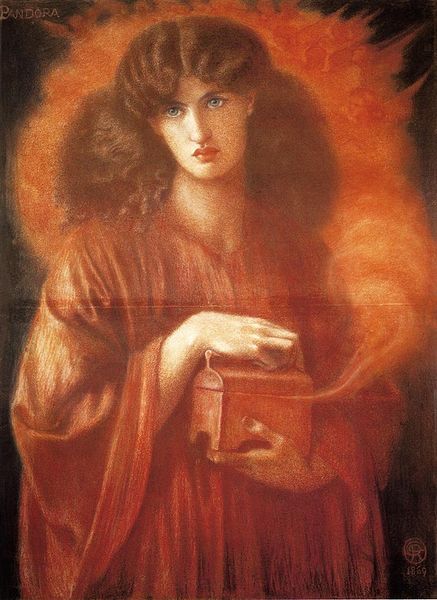In Greek mythology, Pandora is renowned as the first woman ever created. Crafted by the god Hephaestus out of clay, she was given life and bestowed with various gifts by the Olympian gods.
However, Pandora’s creation was not a benevolent act but rather a punishment orchestrated by Zeus, the king of the gods. Her story centers around the mysterious jar (often referred to as Pandora’s Box) entrusted to her by Zeus.
Pandora’s curiosity led her to open the jar, unleashing all the evils into the world, except for one remaining element: hope.
This cautionary tale serves as a reminder of the consequences of curiosity and disobedience, while exploring the complexities of human nature and the enduring presence of hope in the face of adversity.
Pandora Facts
1. Pandora was the first woman in Greek mythology
According to the myth, Pandora was the first mortal woman ever created. She was not born in the same way as other humans but rather crafted by the god Hephaestus at the command of Zeus, the king of the gods.

2. She was created by Hephaestus out of clay
Hephaestus, the Greek god of blacksmiths and craftsmanship, shaped Pandora out of clay. He meticulously crafted her form, paying attention to every detail, just as he had done with other remarkable creations.
3. Pandora was given various gifts by the gods
The Olympian gods each contributed something to Pandora’s existence. They bestowed upon her different qualities and attributes. For example, Aphrodite, the goddess of love and beauty, gifted Pandora with exceptional beauty, making her captivating to behold.
Also Read: Facts About the Minotaur
Hermes, the messenger god, granted her the gift of persuasion and eloquence, enabling her to communicate effectively. Athena, the goddess of wisdom and skill, endowed her with craftsmanship and artistic abilities, making her a masterful artisan.
These divine gifts made Pandora a unique and captivating being, encompassing both physical attractiveness and a range of desirable qualities.
Also Read: Prometheus Facts
However, despite her exceptional attributes, her creation was ultimately intertwined with a greater purpose in Greek mythology, which led to significant consequences for both Pandora and humanity.
4. Zeus ordered Pandora’s creation as a punishment for humanity
Pandora’s creation was not a benevolent act but rather a punishment orchestrated by Zeus, the king of the gods. Zeus sought to punish Prometheus, a Titan who had defied the gods by giving fire to humans.
To enact his revenge, Zeus ordered Hephaestus to create Pandora, an alluring and deceitful woman, who would bring misery and suffering to humankind.
5. She was given a jar (often referred to as Pandora’s Box) by Zeus
As part of Pandora’s creation, Zeus presented her with a jar, although it is often mistranslated as a “box” in modern retellings. The jar held within it various evils and afflictions that would afflict humanity once opened.
Zeus cautioned Pandora never to open the jar, emphasizing the consequences that would follow if she succumbed to her curiosity.
6. Pandora’s curiosity led her to open the jar
Despite the warning, Pandora’s curiosity became overwhelming. Unable to resist the allure of the mysterious contents within the jar, she eventually gave in and opened it. This act of disobedience unleashed a torrent of misfortunes and troubles upon the world.

7. Opening the jar released all the evils into the world
Diseases, sorrows, plagues, and countless other afflictions escaped from the jar and spread throughout humanity, forever changing their existence.
Pandora’s decision to open the jar, driven by curiosity, serves as a cautionary tale in Greek mythology. It warns against the dangers of unchecked curiosity and the potential consequences that can arise from disobedience.
This act is seen as a pivotal moment in human history, as it introduced suffering and hardship into the world, forever altering the human experience.
8. The only thing left inside the jar was hope
As Pandora opened the jar and unleashed all the evils into the world, one thing remained trapped inside: hope. Hope, personified as a spirit or an entity, lingered at the bottom of the jar, unable to escape.
Despite the dire circumstances and the presence of numerous afflictions, hope remained as a glimmer of optimism, symbolizing the human capacity to endure and find solace even in the face of adversity.
9. Pandora was married to Epimetheus, brother of Prometheus
After being created, Pandora was sent to Epimetheus, the brother of Prometheus, to be his wife. Epimetheus, whose name means “afterthought,” was known for his impulsive nature and tendency to act without thinking. He accepted Pandora as his bride without considering the potential consequences of her presence.
10. Pandora’s story has had a lasting impact on literature, art, and popular culture
The myth of Pandora and her box (or jar) has endured throughout history and has had a significant influence on various forms of artistic expression. It has been portrayed in numerous paintings, sculptures, and literary works.
The metaphor of “opening Pandora’s box” has become a common phrase to describe the unintended consequences of an action or the release of troubles. Pandora’s story continues to resonate as a cautionary tale, exploring the complexities of human nature and the presence of both hope and suffering in the world.
The tale of Pandora not only reflects the ancient Greek understanding of the origins of human suffering but also provides insights into the human condition and the potential consequences of our actions.
